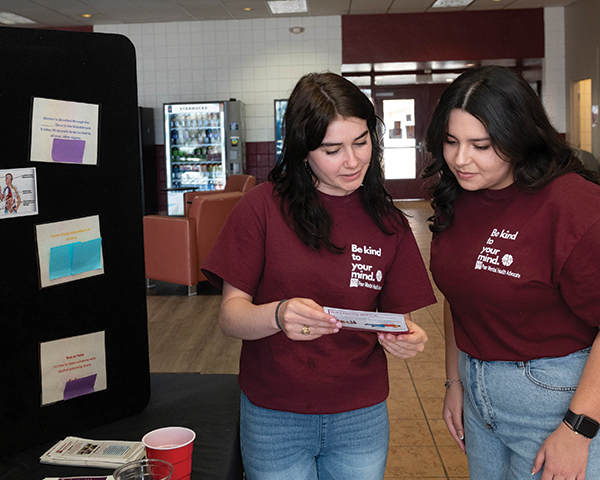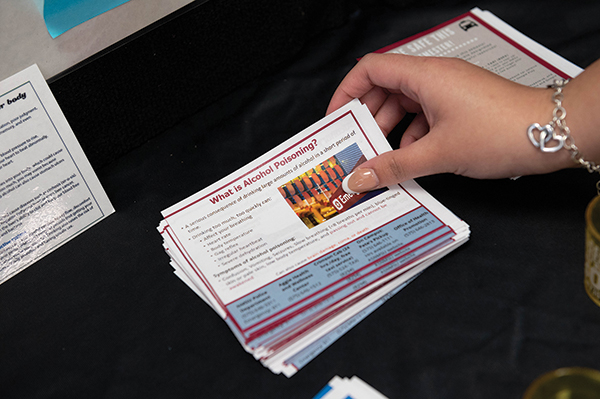Camryn Wharff knows issues like depression, addiction and suicide can often spark difficult, uncomfortable conversations–even among students. But staying silent about such struggles is not an option for Wharff or her fellow peer mental health ambassadors at NMSU.
“It’s one of the most important conversations you can have,” she says, “and you can save someone’s life doing it.”
A one-year pilot program launched in fall 2022 at NMSU trained dozens of students like Wharff, a freshman majoring in psychology, in mental health first aid, suicide prevention and public health campaigning. She is now one of 50 peer mental health ambassadors on a mission to destigmatize mental health across NMSU and build a peer-to-peer network of support for students.
“Our idea is to create a culture of mental health promotion,” says Jagdish Khubchandani, public health sciences professor.
Khubchandani is one of the driving forces behind the program, “No Mind Suffering Unheard,” along with Amanda Blair ’07 ’10 ’18, assistant director of the Aggie Health and Wellness Center. Together, they developed the program through a $50,000 grant from the New Mexico Higher Education Department and support from NMSU’s Department of Student Life and Vice Chancellor’s Office.
“Research shows many professors and students don’t know how to deal with someone in crisis–and that’s why we decided to intervene,” Khubchandani says.
Wharff and the other students who applied and were admitted into the program spent much of the fall semester completing required trainings, which spanned about 25 hours over several weeks. They trained in Question, Persuade, Refer suicide prevention and National Association of Student Personnel Administrators peer education and learned how to safely administer Narcan, a nasal spray that can reverse opioid overdoses.
“There was a lot of talk about depression and addiction and suicide–all very heavy topics,” Wharff says. “It was very intense, but I learned so much.”
Tamera Thomas, another peer mental health ambassador, says that while all the trainings gave her a wealth of hands-on experience in mental health screening, the unit on suicide prevention stood out.
“I feel more confident talking to people, recognizing the cues and knowing what to say in crisis scenarios,” she says. “It’s been such an eye-opening experience.”
Thomas, a nursing student who expects to graduate in December 2023, believes the skills she honed as an ambassador will help when she enters the workforce.
“Because of this program,” she says, “I’ll know how to help people better as a nurse.”
Over the spring 2023 semester, Wharff, Thomas and the other ambassadors focused on spreading their new knowledge. Clad in crimson tees with “988” scribed on their backs–a reference to the 24/7 Suicide and Crisis Lifeline–they hosted weekly tabling events throughout campus, speaking to hundreds of students about mental health and directing them to resources that offer support.
They also organized a mental health resource and wellness fair in March 2023.
“Our ambassadors are openly talking about these issues, and they’re reaching out to many more students, sharing their expertise and promoting mental health,” Khubchandani says.
Thomas and others are pushing for the ambassadors to have a permanent presence on campus after the one-year grant ends in May 2023.
Blair, meanwhile, sees the pilot program as the start of a new strategic effort to tackle mental health at NMSU.
“The intent moving forward with the peer mental health ambassadors is to help them create an NMSU-chartered student organization focusing on mental health involvement and continue to provide them the support they need moving forward,” Blair says. “There’s clearly a need and a want for these students to discuss and bring to light mental health issues.”
Wharff agrees there’s a strong need for the program to continue and grow–and believes it can have a significant impact on students’ well-being.
“We need to end the stigma–and this program can help,” she says. “Everyone struggles, and there’s no shame in struggling or asking for help. The more we talk about mental health, the more it becomes part of everyday life, and we can save lives by doing that.”


Launched in fall 2022, the one-year pilot program, “No Mind Suffering Unheard,” has 50 peer mental health ambassadors working to destigmatize mental health across NMSU.

Dove Hall, Room 212
305 N. Horseshoe Drive
Las Cruces, NM 88003